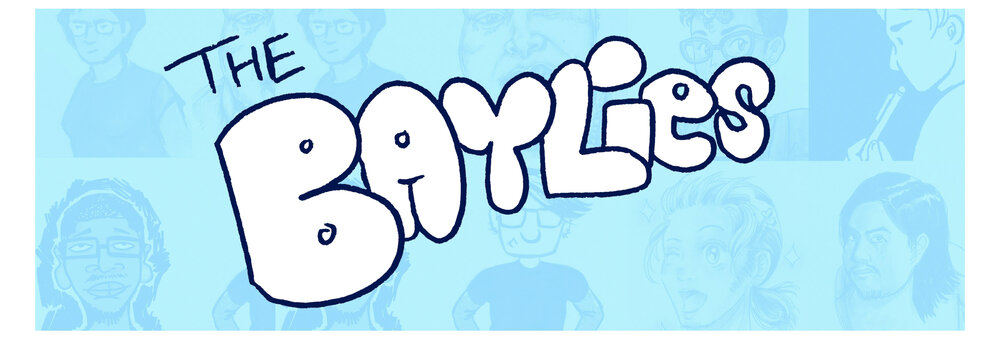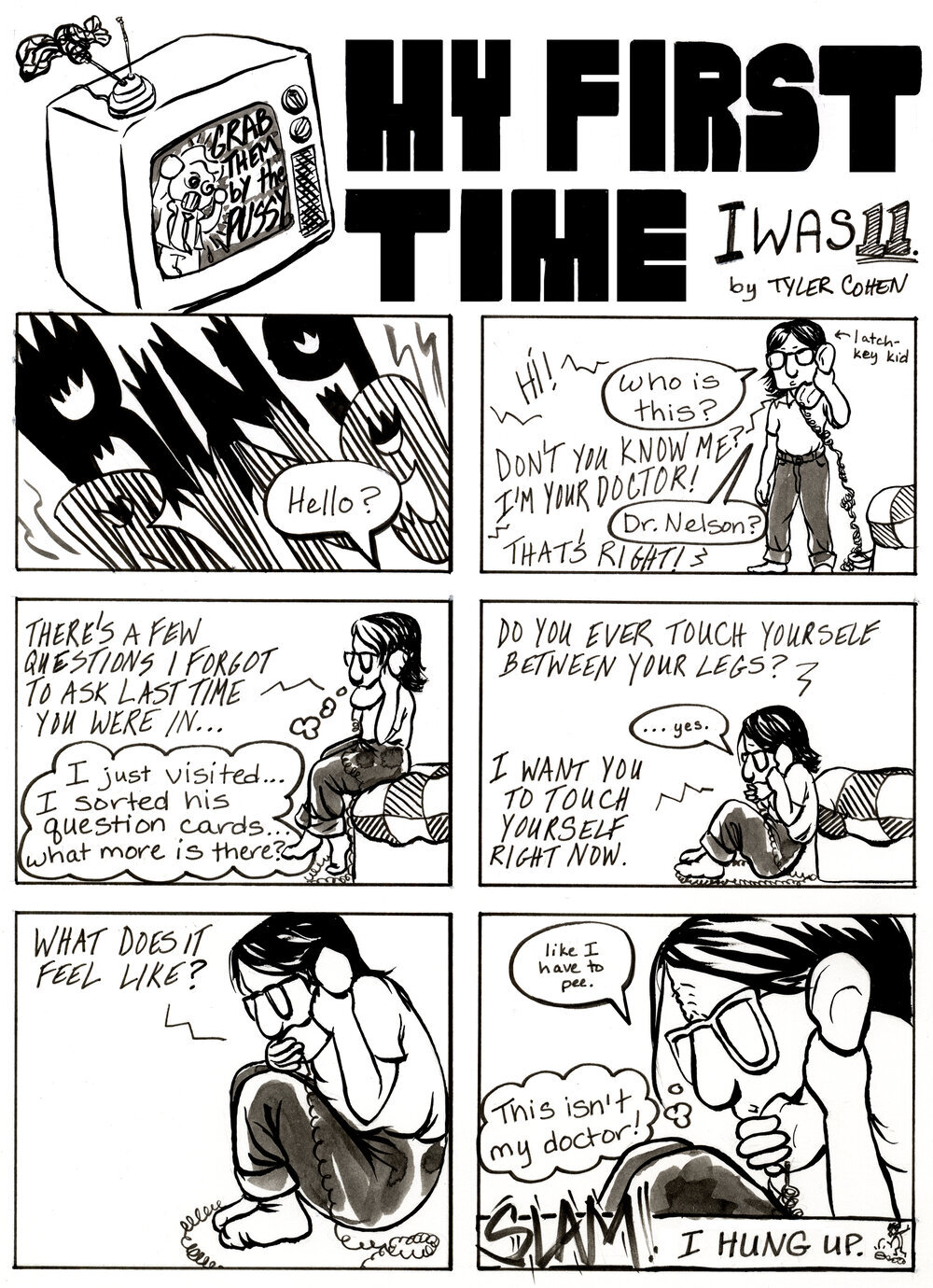I know Tyler because of Zine Fest. We always end up trading with each other. Tyler’s comics and character designs are super unique. They way in which Tyler crafts a story is incredible unique as well.
Whenever we see each other, Tyler is always encouraging and recommending resources. Tyler has a way of teaching, but at the same time using the moment as an opportunity to learn. My favorite thing I have ever gotten from Tyler was a series of Holiday Cards that we put on our tree every year.
You can find Tyler's work in the Eisner Winning ‘Drawing Power’ Anthology and the Ignatz Award-winning anthology, ‘Qu33r’ as well as many more projects.
I recommend checking out their slice of life comics Primahood: Magenta, which is how I first got into Tylers work.
PRIMAHOOD: MAGENTA





TYLER COHEN INTERVIEW 2020
How are you doing?
T: Well enough. It helps that I was already a homebody. But I miss my friends and hugs. I used to really enjoy the bustling streets of this city and now have anxiety when there are too many people about; so, unfortunately, there's that. It's also the first time in nearly two decades that I wish I had a car. But I'm grateful to live near a park and grateful for the love in my home.
Are you from the Bay Area or did you move here?
T: I moved here in March 1998. This is my home.
Where are you originally from?
T: My childhood was on the East Coast.
When did you start making comics?
T: I first started teaching myself to draw and make mini-comics in Chicago, where I went to college and lived for a while afterwards.
How has the progression of your cartooning career impacted your life?
T: “Progression" makes me laugh, because it feels more like a chaotic multidirectional tangle, full of starts, stops, and cosmic spirals. But no matter what, it's fed me and given me community. It's also informed my professional life as a graphic designer and given me the opportunity to be an educator.
How have you grown since your earlier comics?
T: Besides the obvious skills answer, I've learned to trust my own voice more, and my comics voice has opened to become many-voiced—more composite—on the page. I've become better at editing and at dancing that balance between image and the least but necessary amount of verbalization. I've also become less likely to self-censor.
What are some of your most memorable moments of your career so far?
T: Getting my stories welcomed and published at Mutha Magazine by the founder, one of my heroes, Michelle Tea. All the people who welcomed my work and helped open the way for it to reach others—this so often has been from other queer cartoonists, to whom I will always be grateful—such as when Robert Kirby invited me to contribute a story to Qu33r, an anthology which would win an Ignatz award. When my book Primahood: Magenta came out—the support, positive reception, and new relationships that developed out of that conversation (I think of books, or what I want to do with art, as a conversation); when the book won the Bisexual Book Award; and led to my solo art show at The Center for Sex and Culture (RIP), curated by Dorian Katz. Most recently, when Drawing Power, another anthology edited by one of my comics heroes, Diane Noomin, won the Eisner Award. I've been so blessed to get to meet so many of my comics heroes and to find so many of them to be kind, welcoming, encouraging people. Speaking of welcoming, encouraging people, getting to participate in the first few Comics Camp with a whole bunch of fantastic, mostly Bay-Area cartoonists has been absolutely wonderful, nourishing, and community building. I've also relished whenever I've had the opportunity to teach and share my love of, and have many discussions about the medium.
What is different about The Bay Area comics scene compared to other places you have been?
T: The Bay Area comics scene is much more diverse than anywhere else I've been—diverse in all senses. Partly, this is the nature of the Bay Area, itself, but it may also be that comics, in general, and in particular small-press and mini-comics, is so much more diverse than it was a bazillion years ago when I first started making minis. It also feels less inclined to be clique-ish.
Any comics recommendations?
T: So many! Comics by all the Baylies cartoonists, of course. I just got my hands on Aspara Engine by Bishakh Som, which is gorgeous and I'm really looking forward to spending some time with. Thien Pham has been putting some fantastic work up on Instagram. He's posting pages from a WIP graphic memoir about his life "told through his most memorable meals." He's posting as he works on it, including reflections on the process and answering questions—which in itself is a fascinating process. I'm also a big fan of Rachael House's comics, also viewable on Instagram (she's British).
Any cartoon/tv shows or movie recommendations?
T: Tuca and Bertie, of course. Queen Sugar, The Expanse, These Thems (a YouTube series), Birds of Prey (and the Fantabulous Emancipation of One Harley Quinn)—I like the original title, go ahead, call me a nerd...
What influences your work?
T: Everything? Books I read, introspection, talks with friends, other art...my feelings...
What do you want to do in comics in the next 5 years?I want to come out with a new book. I want to create stronger, more symbolic, raw and witchy stories. I want to be published more broadly and get to engage in even more conversation. I want to keep weaving relationships and networks in the various comics communities—so many wonderful creators and conversations!
What are you working on now?
T: A new memoir. I'm not yet ready to talk about it. I do have a short quarantine comic that I will be putting out soon. And I've been making diary and abstract comics that I've generally been posting directly to instagram and recently put together into a mini. I've really been enjoying making abstract comics when I've been feeling without words.
What does your work represent to you?
T: Life, purpose, a way to process (especially that which is sometimes wordless, visceral). It is also a way to engage in conversation—not just between myself and the reader, but between the reader and the work. Comics/art takes on it's own life. It (should) stimulate thoughts, feelings, introspection, observation, contemplation, dream, ideas, connection. My work is both a way to reflect, to breathe, to meditate, and to process, but also a way to become a part of larger conversations—broad social conversations, and intimate personal ones. And, especially right now, just drawing and playing with color can be a way to soothe myself, to ease anxiety, and to simply be present.
Tylers Comics For The BAYlies 2018
Thank you so much to Tyler for doing this interview. It’s important for me as someone who is here right now to not only archive and document comics history, but to shine light on what has been and still is here.
Please check out Tylers work
Peace and Love
-Lawrence


